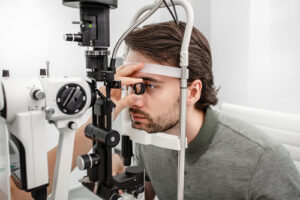Posted by: Clear Advantage in Featured on January 12, 2023
The winter season can be hard on your mind and body, and your eyes are no exception. The winter months can affect your eyes differently, from heating systems and harsh winds to more time spent inside looking at screens or digital devices.
While you should take good care of your eyes no matter the season, your eyes deserve a little extra TLC this time of year. When it comes to something as important as your vision, it’s more than worth it to take a few moments to prioritize keeping your eyes happy and healthy.
Keep reading for six tips to follow for better eye care this winter!
1. Drink More Water

Few people drink as much water as they should. Even though it may seem like you are drinking enough, if you keep a diary of your water intake, you may find yourself well below the daily recommendation.
For most, this is around eight eight-ounce glasses per day. People also tend to think less about hydration during the colder months than when it is warm outside.
Every part of your body needs water to function correctly, including your eyes. When your eyes lack moisture, they can feel scratchy or stinging.
You may also find that your eyes burn or water more when they are too dry. Dry eyes can even cause blurry vision.
Wherever you go, carry a bottle of water with you. It can be helpful to make it a habit to drink a full glass of water each morning and evening.
In the winter, you can hydrate and warm up with tea or hot water with a bit of lemon or lime. Don’t forget about soups when you want to hydrate and fill up!
2. Avoid Sitting In Front of Hot Air Vents

There are few things better than coming home to a warm and cozy house on a frigid day. However good as it may feel, that hot air can be harsh on your eyes.
It can dry them out and make you feel uncomfortable fast. If you wear contact lenses, the hot air can take its toll.
Whether at home, at work, or in the car, avoid sitting directly in front of the flow of air. Not only will this help your eyes stay hydrated, but it’s better for your skin too!
3. Reduce Your Screen Time When Possible

How much time do you spend looking at a screen or digital devices daily? In the winter months, this number tends to spike.
In addition to work that involves a screen, many people spend their free time curled up in front of the TV, a gaming system, or another type of screen. However, all this time spent staring at a digital screen takes a toll on your eyes.
You’ve probably noticed how your eyes can feel dry and strained when you spend an extended period looking at a screen. Studies have shown that people blink less during screen time.
When you can, try swapping screen-related activities for other activities, like reading or walking. When spending extended time looking at a screen, be sure to blink and take breaks.
Taking a break from looking at screens, even if it’s only a few minutes, can help your eye muscles feel better. Try something called the 20/20/20 rule.
The 20/20/20 rule helps you remember to give your eyes a break now and then: every 20 minutes, look away from your screen and look at an object at least 20 feet away for at least 20 seconds. You’re not only giving your eyes a break but also allowing them to blink.
Don’t forget to use eye drops or artificial tears during this time if your eyes feel dry or irritated!
4. See Your Eye Doctor If You’re Experiencing New Vision Problems

With all the dry air around you this time of year, from the cold air outside to the hot air inside, it’s common to experience dryness and other new eye symptoms that you didn’t experience before. If you notice any new problems with your vision, don’t hesitate to schedule a visit with your eye doctor.
Sometimes all you need to feel better is artificial tears to give your eyes back the moisture they’re missing. There’s no reason to wait to feel better.
5. Incorporate More Omega-3 Fatty Acids Into Your Diet

Not all fats are bad for you. Some are good for you and particularly good for your eyes.
Specifically, omega-3 fatty acids support healthy eye functioning. If you are experiencing the effects of dry eye, like many people during the winter, omega-3 fatty acids can help alleviate your symptoms.
There are lots of delicious foods that contain these essential fats. Fish like salmon, mackerel, and tuna are excellent sources of omega-3 fatty acids.
Nuts, seeds, and plant oil contain omega-3 fatty acids. You can also talk to your doctor about taking a supplement if adding omega-3 fatty acids into your diet isn’t feasible.
6. Wear Sunglasses When You’re Outside

Sunglasses aren’t something you should put away for the winter, along with your bathing suit and beach towel. The sun emits powerful UV rays every day of the year.
When snow is on the ground, its reflection can be intense. So, don’t leave your eyes unprotected this winter!
Whether you are running errands or going for a walk, be sure to wear your sunglasses. To keep your eyes safe, they should have 100 percent UV protection from all forms of UV light.
Following these simple eye care tips ensures your eyes stay healthy this winter and for many more seasons.
Do you have any questions or concerns about your eye health? Schedule an appointment at Clear Advantage Vision Correction in Portsmouth, NH, today!






